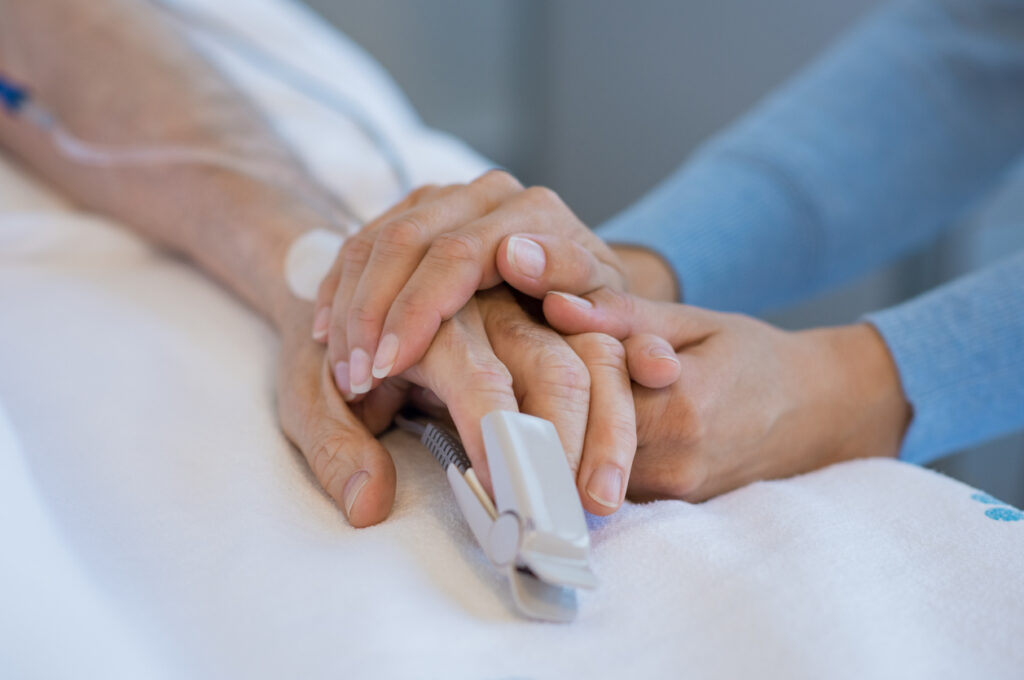Question:
I am a recent (fervent) convert to the Catholic Church. I am also a registered nurse and have held many patients as they passed into eternity. I am concerned over the issue of priests being “barred” from hospitals during the coronavirus pandemic; I have heard many Catholics bemoan the fact that, as a result, the sick and dying are being denied the sacrament of the sick.
Can this sacrament be done by intention? Could we somehow comfort people — those who are denied the sacrament through the inaccessibility of priests — that Jesus can heal simply through his grace and the person’s faith? (Tallahassee, Florida)
Answer:
Your perspective is right on target: Jesus can forgive and heal based on a person’s intention. In fact, in late March 2020, the chair of the U.S. bishops’ Committee on Divine Worship made that same point.
Archbishop Leonard P. Blair of Hartford, Connecticut, explained that what the Vatican had said the previous week about the sacrament of penance can be applied analogously to the anointing of the sick. The Vatican’s Apostolic Penitentiary said:
“Where the individual faithful find themselves in the painful impossibility of receiving sacramental absolution, it should be remembered that perfect contrition, coming from the love of God, beloved above all things, expressed by a sincere request for forgiveness (that which the penitent is at present able to express) and accompanied by ‘votum confessionis,’ that is, by the firm resolution to have recourse, as soon as possible, to sacramental confession, obtains forgiveness of sins, even mortal ones.”
Archbishop Blair issued his statement to clarify and correct a “solution” that had been proposed earlier by Bishop Mitchell T. Rozanski of Springfield, Massachusetts. In an email to priests of his diocese, he had said, “I am allowing the assigned Catholic hospital chaplains, standing outside a patient’s room or away from their bedside, to dab a cotton swab with holy oil and then allow a nurse to enter the patient’s room and administer the oil.”
Speaking to the U.S. bishops, after conferring with the Vatican, Archbishop Blair said, “With regard to the anointing of the sick, it is not possible for the anointing with oil to be delegated to someone else, such as a nurse or doctor.” Bishop Rozanski immediately rescinded the permission he had granted earlier.
Which brings us back to your valuable insight: In a circumstance where a physical anointing is impossible, God can read a person’s soul.
Question:
My family have been dedicated Catholics for generations. Recently, a nephew of mine announced that he is planning to get married in a civil ceremony. (Neither he nor his fiancee is dedicated to a religion. He is a “fallen-away Catholic.”)
As the eldest in the family, I am saddened by this turn of events and have researched the stand of my religion relative to my participation in this union. The guidance I’m finding is not very direct as to the Church’s stance. Can you provide me some clarity? (City of origin withheld)
Answer:
I am not surprised that you are finding varying guidance in your dilemma. It is a “strategy question” with no hard and fast “rule.” You are trying to strike a balance between fidelity to the Church’s teaching and your legitimate desire to maintain family harmony, and different people will have different ideas as to how to do that.
My suggestion: Go to the wedding, but first sit down and talk with your nephew. Tell him that you feel a certain awkwardness in attending, since he is not being married in a religious ceremony. Explain to him what the Catholic faith has meant to you, how it has sustained you over the years, offering comfort and guidance.
Tell him how much he means to you and that your deepest hope and prayer is that, one day, he might return to the practice of the faith he grew up with and seek the Church’s blessing on his marriage.
If you do that, he will not see your attendance as an “endorsement” by the Church, you will not risk a family rupture that could be permanent, and you keep open the possibility of his return to Catholic practice through your prayer and gentle example.
Question:
I have read that Joe Biden, when he was vice president, presided over a same-sex wedding. He professes to be a Roman Catholic. I would think that his officiating at this ceremony would have resulted in his excommunication. Has he been excommunicated? And if not, what is the reasoning behind that? (Little Rock, Arkansas)
Answer:
It is true that in 2016, Biden presided at a same-sex wedding for two men who were longtime White House aides. The ceremony took place at the vice presidential residence at the Naval Observatory.
Reaction from the U.S. Conference of Catholic Bishops was swift. Within a matter of days, three officials of the conference — without mentioning Biden by name,
but clearly referencing his action — said this: “When a prominent Catholic politician publicly and voluntarily officiates at a ceremony to solemnize the relationship of people of the same sex, confusion arises regarding Catholic teaching on marriage and the corresponding moral obligations of Catholics.” Such an action, the bishops wrote, “is a counterwitness, instead of a faithful one founded in the truth.”
Their statement continued, “Pope Francis has been very clear in affirming the truth and constant teaching of the Church that same-sex relationships cannot be considered ‘in any way similar or even remotely analogous to God’s plan for marriage and the family.’“
As to the question of excommunication, Edward Peters, professor of canon law at Detroit’s major seminary, explained at the time in his blog that there is no specific canon that excommunicates a Catholic for officiating at a same-sex wedding and that Biden would have to demonstrate a pattern of behavior that violates Church law in order to trigger formal disciplinary action.

